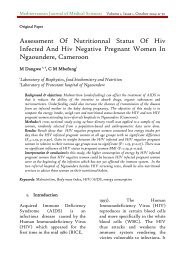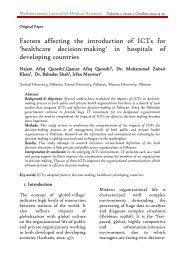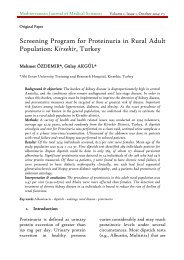Mediterranean Journal of Medical Sciences MJMS
Mediterranean Journal of Medical Sciences,aims to provide a platform for knowledge sharing among academicians, students, researchers, physicians, government entities and other non government entities. Issues : 3 per year ISSN 2385-2712 EISSN 2385-2453 http://mcmscience.org/
Mediterranean Journal of Medical Sciences,aims to provide a platform for knowledge sharing among academicians, students, researchers, physicians, government entities and other non government entities.
Issues : 3 per year
ISSN 2385-2712 EISSN 2385-2453
http://mcmscience.org/
You also want an ePaper? Increase the reach of your titles
YUMPU automatically turns print PDFs into web optimized ePapers that Google loves.
Q. A. Qureshi et al. 43<br />
levels <strong>of</strong> the healthcare<br />
organizations(Durrani &<br />
Khoja, 2009).<br />
The relationship between the<br />
ICTs and better healthcare<br />
service delivery has been<br />
discussed significantly<br />
(Ferraro, 2008; Nowak, 2008).<br />
The present studies have<br />
focused on the introduction <strong>of</strong><br />
particular technologies, such as<br />
the cell phone or the Internet,<br />
but few have examined<br />
empirically the relationship in<br />
detail (Fraser et al.,2007;<br />
Kollmann et al., 2007). One<br />
probable method <strong>of</strong> tackling<br />
this dispute is appraisal and<br />
evaluation <strong>of</strong> user needs before<br />
adoption and use <strong>of</strong> eHealth<br />
systems. However, user studies<br />
which can be very helpful and<br />
productive for adoption <strong>of</strong> ITapplications<br />
in healthcare<br />
sector but unfortunately these<br />
studies are not always carried<br />
out at the right time in design<br />
and development cycle<br />
(Saleem, 2010).<br />
A lot <strong>of</strong> healthcare<br />
organizations implement<br />
telemedicine technology for the<br />
development <strong>of</strong> healthcare<br />
services and increase usefulness<br />
& effectiveness. The<br />
willingness <strong>of</strong> healthcare<br />
organizations and the<br />
availability <strong>of</strong> the suitable<br />
conditions are driving forces for<br />
the implementation and use <strong>of</strong><br />
telemedicine. Earlier studies<br />
showed that a telemedicine<br />
program can be disobeyed by<br />
organizational culture and work<br />
processes (Wootton, 2008)<br />
One main obstruction in e-<br />
Healthcare implementation, either<br />
in developed or developing states<br />
is privacy, secrecy and security<br />
concerns <strong>of</strong> e-Health systems.<br />
The American government, for<br />
example, for the year 2009<br />
reserved 19 billion dollars for ITapplications<br />
in healthcare sector.<br />
However, in spite <strong>of</strong> this massive<br />
investment, e-healthcare adoption<br />
in the USA is still hesitant. Its<br />
expected users for instance<br />
doctors and physicians are not<br />
convinced about the security<br />
issues and concerns <strong>of</strong><br />
information systems in healthcare<br />
organizations therefore they resist<br />
the implementation and use <strong>of</strong> the<br />
same. Furthermore, patients are<br />
also worried about the privacy <strong>of</strong><br />
their medical records. This has<br />
been influenced by a number <strong>of</strong><br />
existing cases involving violations<br />
in e-healthcare information<br />
systems. However, we disagree<br />
that adoption <strong>of</strong> eHealth systems<br />
is not a financial problem as such.<br />
It goes beyond, to include human<br />
faith and belief. Therefore, in<br />
spite <strong>of</strong> concentrating on securing<br />
funds for e-healthcare<br />
http://www.mcmscience.org








